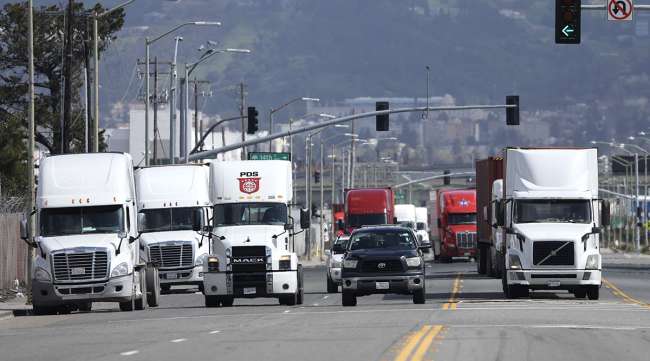Bloomberg News
Truck Makers, California Reach Deal on Zero-Emission Rules

[Stay on top of transportation news: Get TTNews in your inbox.]
Major truck and engine manufacturers have brokered a truce with California’s plan for phasing out sales of Classes 4-8 diesel-powered trucks in a landmark deal with state regulators.
Under the pact announced July 6 between the Truck and Engine Manufacturers Association and California Air Resources Board, state regulators agreed to relax existing standards for nitrogen oxide pollution so they align with the federal government’s rules. Engine and truck makers also will get the assurance of more time to meet new requirements and more protection for legacy engines.
In return, the engine and truck makers are vowing to satisfy the state’s zero-emission vehicle targets and air pollution curbs, even if they are later overturned in court.
Jed Mandel, president of the manufacturers group, praised the plan to align California’s truck emission rules with the federal requirements set to start in 2027. “These trucks are sold in relative low volume, the emission controls are expensive to buy and spreading them across fleets makes sense,” Mandel said.
But American Trucking Associations President Chris Spear in a statement maintained his group’s stance opposing timelines that it views as unrealistic.
“We’ve long advocated for a single, national standard that respects and preserves interstate commerce. However, the trucking industry shouldn’t be strong-armed by the government into an agreement with such terms,” Spear said.

The makers of Transport Topics’ updated Top 100 For-Hire Carriers list examine trucking’s shifting business environment and what it means for the supply chain. Tune in above or by going to RoadSigns.ttnews.com.
He continued, “Our association represents motor carrier members — the paying customers who will inherit the costs of this agreement — and we will not roll over nor relinquish our right to litigate with any party when our interests are threatened. It is clear that America has lost its way when the government bullies the private sector to succumb to unachievable timelines, targets and technologies.”
The coalition backing the plan includes EMA along with Cummins Inc., Daimler Truck North America, Ford, GM, Hino Motors Limited Inc., Izuzu Technical Center of America Inc., Navistar Inc., Stellantis and Volvo Group North America.
The agreement applies to Class 8 tractors as well as some heavy-duty pickups — those weighing more than 14,000 pounds, including models made by General Motors Co., Ford Motor Co. and Stellantis NV, which owns the Ram brand. Between 2015 and 2020, an average of 450,000 Classes 4-8 vehicles were sold annually in the U.S., according to the manufacturers association.
The impact could reach far beyond California because some states adopt that state’s air pollution rules — even when the requirements are tougher than U.S. Environmental Protection Agency mandates.
President Joe Biden’s administration last year reinstated California’s authority to impose its own pollution limits on light-duty vehicles. That reversed efforts by former President Donald Trump to curtail the standard setting power of California, which has long maintained its own, stringent environmental regulations.
CARB Chair Liane Randolph said the agreement demonstrates that industry and the state can unite “to tackle pollution and climate change.”
Want more news? Listen to today's daily briefing below or go here for more info:




